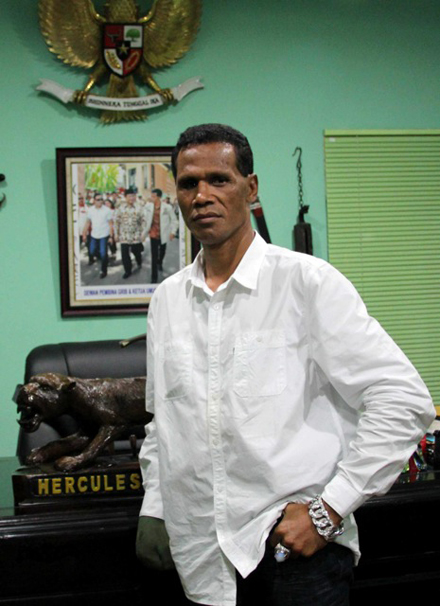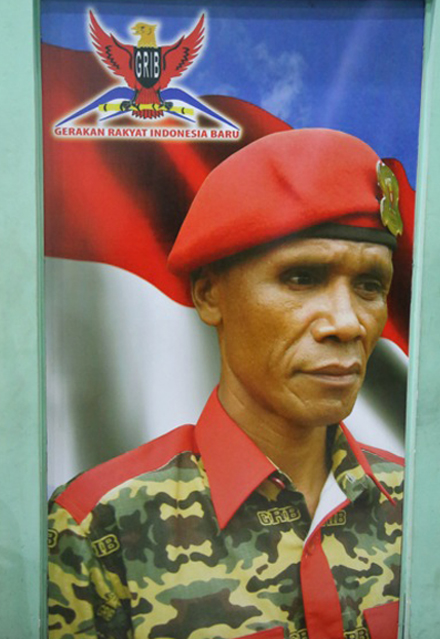The long-running relationship between former Jakarta gangster Hercules and Prabowo Subianto has been one shaped by Prabowo’s obsession with political power, writes Ian Wilson.

Still a free man. Hercules in his office in 2012 just prior to his arrest on charges of extortion. Photo: Ian Wilson.
On 8 May 2014 Hercules Rosario Marcal was sentenced to three years imprisonment by a North Jakarta court for extortion and money laundering. Something akin to a minor celebrity with regular appearances on TV talk shows and in the tabloid press, this latest turn of fate in Hercules’ checkered career as a gangster, entrepreneur and political broker was once again intimately intertwined with the political ambitions of his patron and 2014 presidential candidate, Prabowo Subianto.
Their relationship goes back to the 1980s when Prabowo was serving as a captain in the Kopassus Special Forces in East Timor. Orphaned after his parents were killed during the aerial bombing of Ainaro in 1978, Hercules was later ‘adopted’ by the Indonesian military working as an equipment courier, losing an eye and a hand in fire fights with the Falantil resistance.
According to Hercules, he “owed his life” to Prabowo from this time, displaying a loyalty of unusual longevity and perseverance in the world of Indonesian politics. As he put it “Prabowo is the only man who can strike me without me lifting a hand to retaliate”.
In the late 1980s Hercules along with several dozen East Timorese youth were brought to Jakarta as part of a program run by Siti Hardiyanti Rukmana, Suharto’s daughter and by now Prabowo’s sister- in-law. Given jobs making electrical parts, these were soon abandoned for a harsh life in the city’s streets. Finding his way to the central market district of Tanah Abang, Hercules and his gang of fellow Timorese fought their way to the top of the local gang hierarchy, establishing a mini- racketeering empire extracting protection money from vendors, store owners and pimps while performing political tasks on behalf of their military patrons, such as intimidating pro-independence East Timorese or hosting pro-government rallies.
Splits within Hercules gang after a member was allegedly shot by the police for refusing to participate in pro-integration activities, started the eventual unravelling of his hold over Tanah Abang. In what amounted to a deep betrayal, Prabowo publicly denied having ever met Hercules, in doing so giving the green light to other gangs to launch a takeover bid. His political value to Prabowo had, for now, effectively expired. By 1997 he’d been forcibly removed from Tanah Abang after several days of bloody street fighting, to be replaced by ethnic Betawi and Madurese gangs led by figures such as Bang Ucu and Abraham Lunggana, now a PPP legislator, chairman of Jakarta’s regional parliament and also supporter of Prabowo’s presidential bid.
A song immortalising Hercules gang’s early days in Tanah Abang by former gang member, KK Cobra. Source: YouTube.
Post-expulsion Hercules set about rebuilding his career and reputation with a lucrative debt collection, security and land brokering service that catered to the city’s business and political elites. Through this he was able to buy into the fishing industry, purchase swathes of rice-farming land and a Catholic management college, becoming something of a philanthropist with regular donations to several orphanages. He continued to be embroiled in Jakarta gang politics with ongoing violent feuds with rival eastern Indonesian gangsters John Kei and the late Basri Sangaji. Hercules remained a first point of call for many new arrivals to Jakarta from eastern Indonesia who turned to him for work, a place to stay and protection. Renowned for his generosity and loyalty to his gang, he developed a significant network of devoted supporters.
Hercules’ relationship with Prabowo, shattered in the wake of his expulsion from Tanah Abang, wasn’t re-established until 2008 when Prabowo set up Gerindra as the political vehicle through which he would contest the presidency. He needed Hercules’ street level networks and ability to mobilise. Hercules had tried his luck with other elite patrons, in 2004 joining Yudhoyono’s presidential re-election success team, later claiming the Democrat Party had “used and exploited me, then me cast aside”. He jumped at the request to serve Prabowo again.
In 2011 The Peoples Movement for a New Indonesia (Gerakan Rakyat Indonesia Baru or GRIB) was established by Hercules as an ostensibly independent social organisation dedicated to ‘defending and empowering the poor and the oppressed’ combined with a political mission to bringing Prabowo to the presidency. With strict orders to avoid any overt criminal activity, GRIB has become a highly disciplined organisational umbrella for Prabowo’s extensive networks of gangsters, local strongmen, Islamist vigilantes, ex-militias and martial arts groups, with his most loyal follower in command. Throughout his military career Prabowo had fostered a menagerie of violent groups, such as the infamous Gada Paksi militia in East Timor, mastering a well-established military practice of fostering working relationships with the criminal underworld and local gangsters as a means of consolidating territorial control. He has brought this logic to the task of winning the presidency.
Piggy-backing on the national party structure of Gerindra, GRIB quickly established branches in 30 provinces and 265 districts, with a membership claimed to be in the hundreds of thousands, though realistically closer to around 50,000. GRIB’s expansive headquarters in Kemanggisan, West Jakarta is something akin to a bizarre shrine to Prabowo and Hercules relationship, with dozens of portraits and wall-sized murals celebrating their “close emotional bond’.
On the ground GRIB has acted as a key element of Prabowo’s PR machine, distributing cash, food and goods to the poor, and working to co-opt to the cause what Gerindra officials refer to as “local opinion leaders” such as strongmen, village heads and religious leaders. The reasoning behind such a strategy is twofold: to use their influence and authority to mobilise electoral support in the lead up to the 9 July election, and to have in place a grass roots network ready to ‘secure’ the result. It has also offered its services as a means of brokering support for Prabowo. In December 2012 for example, GRIB acted as security for a demonstration of over 12,000 civil servants from the Indonesian Association of Village Officials in front of the national parliament, establishing links now proving crucial in consolidating Prabowo’s campaigning in rural areas.
GRIB distributing food to becak drivers. Source: YouTube.
The rapid growth of GRIB in Jakarta unsettled the police and segments of the city’s political elites, reflective as it was of Prabowo’s aggressive counter-insurgency style approach to political campaigning. The police in particular are rumoured to be worried a Prabowo presidency may see them lose their post-1998 ascendancy over the army, both politically and financially. Forming a special ‘anti-thug’ unit, they began targeting Hercules’ networks in North Jakarta, arresting him and a dozen of his gang in 2012 for extortion and again immediately upon his release six months later.
Gerindra officials insist the arrests were politically motivated, some claiming that the President himself had given the order to remove Hercules from the streets for the duration of the campaign period. Regardless of the truth or otherwise of these claims, GRIB has displaced or co-opted numerous gangs and ethnic militias throughout the city in a relatively short space of time, disrupting and realigning the ‘balance of powers’ in the political economy of street-level authority. In a world where loyalty is often largely contingent, GRIB and Gerindra have been able to outbid and out-manoeuvre their political rivals.
Faced with a lengthy and very public trial close to the beginning of the formal presidential campaign period, Prabowo once more distanced himself from Hercules’ troubles, no doubt concerned any show of public support could be used as ‘black campaign’ fodder by his rivals. An initial appeal lodged by Hercules against his guilty verdict was later withdrawn, the party hierarchy reportedly telling him to ‘wait and see’ what transpires after the 9 July election. As a true loyalist, Hercules complied.
Hercules has continued to run his organisation from inside Cipinang prison with weekly meetings with GRIB functionaries. Three of his gang who were granted sentence remissions refused the opportunity to be released, preferring to stay inside and protect him. Deploying his organisations significant financial resources, he provides regular free meals and clothes to fellow inmates developing a loyal following who also, unsurprisingly, are now committed to supporting their new boss’s boss, Prabowo Subianto. Many will likely join the ranks of GRIB on their release.
According to GRIB’s secretary-general, if Prabowo wins they will work to “support and protect” his presidency and seek to “economically empower the poor and marginal”, perhaps hoping to take on a role not dissimilar to that played by pro-New Order youth organisation Pemuda Pancasila. When I asked what they’d do in the event of a Prabowo loss, the response was slightly more unsettling; “It’s simple, he can’t lose. It would mean the end of us. We’ll do whatever it takes to ensure Prabowo Subianto is the next president of Indonesia”.
Dr Ian Wilson is a lecturer at the School of Management and Governance and a research fellow at the Asia Research Centre, Murdoch University.
 Facebook
Facebook  Twitter
Twitter  Soundcloud
Soundcloud  Youtube
Youtube  Rss
Rss 